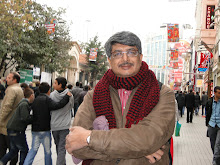In my two previous posts, I first spoke of
This young nation came into being with plenty of trauma associated with childbirth and seemed to be in a state of turmoil for a considerable period of time after that. A union of states was fused together into
Through this exquisite and colourful collage, what we witness is large homogenous groups coming together to constitute a great idea called
Regionalism was and is the life of this collage. The existence of regionalism is a logical corollary to the idea of
This was, to my mind, further aided by the formation of states on a linguistic basis. This, of course, was not a smooth process and there was much violence and ill will at that time. Many experts also questioned the wisdom of forming states on a linguistic basis. Doomsday prophets were quick to dub this as a divisive move which would eventually disintegrate
I feel this was an erroneous and short sighted view taken by people. I remember even Prime Minister Rajiv Gandhi had once remarked that linguistic division of states was a mistake. I believe that states formed on linguistic basis has given each group in the country a social and cultural platform to express themselves, evolve and develop in a way they want. Further, some contentious and emotive areas were not the cause of prickly Centre – State relations.
When I reflect on all this and the current reality of a fractured polity referred to in my earlier post – The Concept of Nationhood, some pertinent questions arise in my mind
- Was social and cultural autonomy fuelling larger ambitions of people?
- Were the spill over of these ambitions into the political field inevitable?
- Is the desire for social, cultural and political hegemony responsible for the aggressive expression of regionalism?
- Have these attitudes of certain groups contributed to strident regionalism in other groups?
- Could there be other reasons which have contributed to regional insecurity and instigated those people to become extremist in thought, word and deed?
- Can economics reasons fuel an aggressive regional approach?
- Why do people feel safe with their own political dispensations in place?
I will try and examine some of these issues in my following posts. I believe that the rise of regional political aspirations, are an extension of our social and cultural evolution and, perhaps, aided by some other factors like mis-management, prejudice and short-sightedness which seem to have compounded matters.




